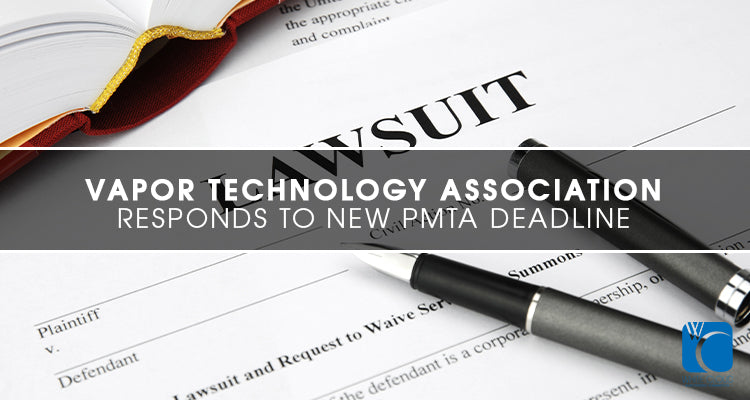With the vaping industry under legal fire from a wide variety of government agencies and public health groups, the industry needs a powerful advocate to bolster the case for proving vaping products do not present a health risk for American consumers. Fortunately, the Vapor Technology Association has stepped forward to fight back against recent Food and Drug Administration (FDA) regulations that pertain to premarket tobacco applications (PMTAs).
Vapor Technology Association Files Yet Another Lawsuit Against the FDA
A recent lawsuit filed by the Vapor Technology Association (VTA) against the FDA and the Department of Health and Human Services asked a federal court to prevent both government agencies from implementing the new PMTA guidelines. In contrast to previous deadlines set by the FDA, the new PMTA guidelines give the vaping industry little time to prepare for a large number of different vaping manufacturing and distribution standards. The FDA initially established deadlines for PMTAs in 2018, then extended the deadlines to 2021 and 2022. Now, the FDA and the Department of Health and Human Services has set May 11, 2020 as the deadline for PMTA submissions.
Details of the Legal Complaint Filed by the VTA
Filed in the United States Court for the Eastern District of Kentucky, the legal complaint crafted by the VTA requests the federal court provide “preliminary and permanent injunctive relief” by requiring the FDA and the Department of Health and Human Services to follow a set of strictly enforced legal guidelines. Injunctive relief typically stops current efforts to implement certain policies. For the VTA case injunctive relief involves four legal requests.
The VTA wants the FDA in particular to establish a rule finalizing a PMTA submission deadline. In addition, the VTA has asked the FDA to set a “reasonable deadline for filing PMTAs”, which the vaping industry advocacy group wants to happen after the FDA provides notice of a finalized rule for a submission deadline. The VTA also wants the FDA to refrain from taking enforcement action against vaping industry products deemed legal by federal law, as well as not take legal action against vaping industry products until the new deadline for PMTAs has been legally mandated.
According to the VTA legal complaint. “Absent prompt intervention by the Court, the overwhelming majority of the vaping industry, including over 160,000 jobs at small- and medium-sized businesses, will be destroyed.” With more than three million vaping industry products registered in an FDA database, the VTA insists “the arbitrary May 2020 PMTA deadline which FDA is currently enforcing is simply impossible to meet for thousands of small and mid-sized vapor businesses.”
Executive Directors of the VTA, Tony Abboud, echoed the frustration heard from thousands of small businesses that are devoted to selling vaping products. “FDA’s constantly shifting regulatory process is wholly unreasonable, unfair and unlawful,” he said. The agency has failed to provide advance notice or an opportunity for public comment as required by the Administrative Procedure Act. Grossly accelerating the deadlines and then repeatedly changing the already onerous requirements is unacceptable under any regulatory regime.”
Why We Have Arrived at This Point
On July 12, 2019, United States District Court Judge Paul W. Grimm ordered the May 11, 2020 deadline for PMTA submissions. Judge Grimm issued his ruling in response to several special interest groups suing the FDA for originally extending the PMTA submission deadlines from 2018 to 2021 and 2022. If it were just the ruling of one United States District Court judge, the issue of the PMTA deadline would have taken a back seat to other more prominent legal issues at the federal level.
Because of the rapidly growing outcry concerning vaping-related lung illnesses, many nationally operated media outlets have brought the vaping industry to the front and center of American news stories, while the UK which embraces e-cigarettes as a less harmful alternative to tobacco cigarettes, there hasn’t been a single lung illness tied to vaping nor is there a “youth vaping epidemic”… the things that make you go “Hmmm”.
Meanwhile in the U.S., the outcry has become intense enough for the FDA to consider banning every flavored vaping liquid on the American market. Now, the VTA not only has to fight a legal battle in court, it must also stall the momentum created by public health proponents to outlaw the vaping industry in the same way the alcohol industry was banished from commercial sales during the Prohibition Era.
Where We Stand Today
Make no mistake: the FDA will not advocate for vaping industry interests. Shortly after Judge Grimm released his order, the acting commissioner of the FDA, Ned Sharpless, insisted the vaping industry has plenty of time to meet the new PMTA submission deadline. “Let me be clear with the tobacco industry: responsible manufacturers certainly don’t need to wait 10 months to act,” he said in a press release.
Tony Florence, who is the president of Lexington, Kentucky-based Vapor Stockroom LLC replied to the dismissive statement made by Sharpless. “Our company complied with every regulation imposed by the FDA and invested in our business while waiting for the FDA to deliver on all of the promised PMTA rules, guidance and standards. We never thought that the FDA would wait so long to provide any direction and then immediately shrink the deadline so that we had no chance to stay in business,” Florence said. “It’s a devastating one-two punch to small businesses all over the country.”
Hopefully this case is taken to a judge who can make a sensible ruling, like the judge in Michigan who sided with a group of vaping businesses and blocked the flavor ban based on evidence that adults could return to smoking more harmful tobacco products. We can only hope this type of common sense can make its way to the case for PMTA deadlines and more sensible vaping regulations.






